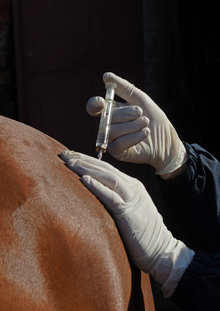Wild horses on the Assateague Island National Seashore are living longer, with less impact on their natural surroundings, thanks to birth control.

Horse receiving vaccine
The National Park Service has been managing horses on AssateagueIsland for more than 20 years using the PZP fertility control vaccine and the PZP has also helped reduce negative impacts on the park's natural habitat and other native species.
The horses on Assateague Island, off the coast of Maryland, have been managed by the National Park Service for more than 20 years using the PZP fertility control vaccine. According to a story published by the Daily Times of Salisbury, Md., management of the horses with PZP has helped reduce negative impacts on the park's natural habitat and other native species.
>Fertility control also is helping horses to live longer. In 1990, hardly any horses lived past 15. Now, the horses are living to 30 and older.
According to Assateague Science Communicator Kelly Taylor, females in the herd receive the vaccine starting when they're two, but then go off of it when they're four until they deliver a live foal. It's the equivalent of preventing a scenario similar to a teen pregnancy, where the horse's body isn't fully developed and ready to give birth.
The vaccine is unique because it is effective at preventing pregnancy but doesn't impact the horse's hormones, meaning their social behavior remains the same.
"We're not actually altering the way they interact with each other," Taylor said.
The vaccine is also allowing the mares to live much longer. Instead of focusing on raising babies throughout their lives, they give birth once, typically, then have the rest of their years to focus on themselves.
For more information on wildlife fertility control, including PZP, visit the Animal Fertility Control Vaccine Information Page at http://www.animalfertilitycontrolvaccine.org. The site includes background information regarding the potential to manage wild horses, urban deer, bison, elephants and other species in a more humane way.
